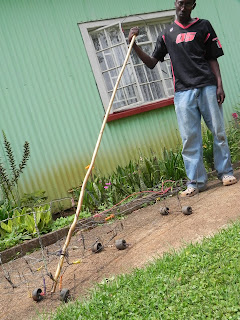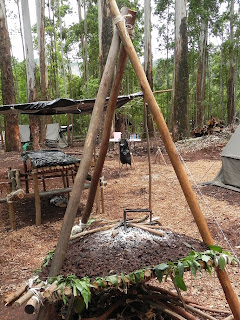Sibusiso Magagula is the Bulembu Country Lodge Manager. We asked him a few questions about Christmas and what his goals are for 2011:
How are you going to be celebrating an African Christmas?
I’ll be working this Christmas, because we have a few guests at the Lodge.
What do you enjoy most about Christmas?
The most exciting thing about Christmas is the birth of Jesus Christ and getting together with my family. It is very important for me to spend time with my family.
Do you have a favorite Christmas carol?
Hark the Herald Angels Sing.
Have you experienced a white Christmas before?
No.
What do you think it is like?
I think Christmas is more exciting in countries where they have snow.
What was a highlight for you in 2010?
I was more involved with running the Lodge this year. Last year I had Mr. Vernon and Mr. Andrew’s input, but this year it has been a big challenge for me because I have had to oversee everything. If I have to make crucial decisions, I have to make sure the Lodge is up to standard. We have to keep on pushing for a higher standard. I think this year I have learned a lot and I have achieved many of my own personal goals. When big groups come in, we need to be prepared. I need to sit down a month before and plan for the groups so that we can be ready. The biggest challenge for me this year was the bicycle race in October. There were 220 people in town and we had to organize beds, bedding, plates, glasses and cutlery. It was hard work, but we achieved it. We were ready for them a week before the time. We were able to learn from our past mistakes.
What are you looking forward to next year?
I am looking forward to the opening of our Hospitality Training Centre and our conference centre. I am looking forward to working with Rose Woller who will be assisting with the Lodge. Next year, my biggest dream is to see the Lodge moving forward, improving service and operating at a higher standard.
What has been the biggest change in Bulembu in the last year?
I think it’s continuously changing. Previously in management I was reporting back to Mr. Andrew, but now we have the directors of different departments which lightens Mr. Andrew’s load. Now I am dealing with Mr. Collin le Roux on a daily basis so that is a step forward for Bulembu. The Hospitality Training Centre is also another big change that is happening in Bulembu.
What is the biggest challenge you face in the year ahead?
The biggest challenge in 2011 is to improve the Lodge, coming up with new ideas and more specifically coming up with new kitchen menus. I am trying to introduce new meals. I am going to try and transform my staff at the lodge through service improvement, to have the staff all on the same page and for them to know exactly what’s going on, what events are coming up and what teams will be visiting the lodge. Maybe there is even a chance for the staff at the Lodge to be put through the vocational training course. To me that would be another step forward.
What’s best about living in Bulembu?
It’s a quiet place. It’s less expensive than other towns. There are no shops for you to spend your money unwisely.
What do you wish for Christmas for yourself?
I wish for a good life for my family and myself and for everybody who lives in town.
What do you wish for Christmas for Bulembu?
I wish that God would give the people of Bulembu strength. They have been working hard for the last 12 months and I hope that they all come back next year. I also wish them a Merry Christmas and prosperous New Year.





































